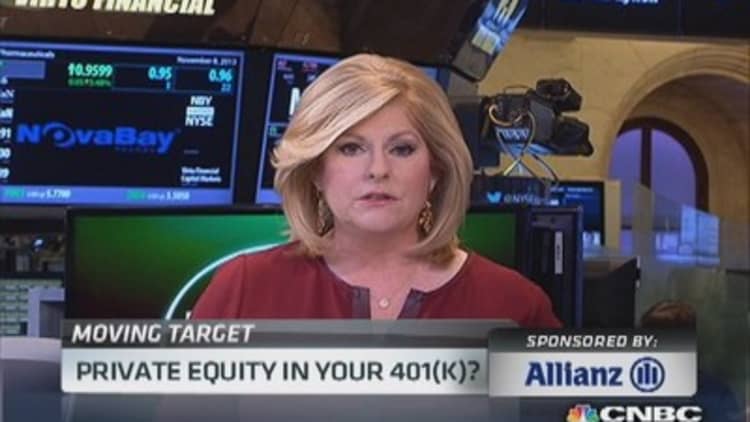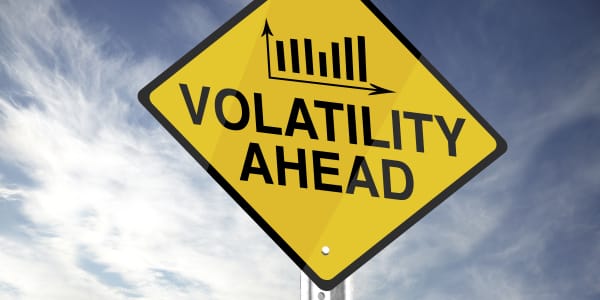Making money in private equity is sort of like a high-wire act: The experts make it look easy, but how wise is it to try it at home?
If and when private equity arrives in your 401(k), be prepared: One private equity firm, for instance, is marketing private equity to target date–fund designers. With these high-performing high-priced funds, you'll need to have a long time horizon and do some digging to understand what you're actually investing in—and whether they make sense for you.
CNBC recently sat down with Alice Handy, the CEO of Charlottesville, Va.–based Investure, one of the top institutional managers in the country, to ask how 401(k) investors could take advantage of private equity—and which ones investors should try. It's worth noting that private equity funds are also becoming more available through registered investments advisors to accredited investors: those with $200,000 in income for the past two years or $1 million in net worth.
Handy, who formerly managed the University of Virginia endowment, now manages the endowments for Barnard, Smith College and the Rockefeller Brothers Fund, among others. In 2011, Handy hit the headlines: Her strategies beat the returns of the endowments at Harvard and Yale universities after her gutsy bet against U.S. stocks prior to the financial crisis. (The following is an edited version of the interview.)
Source: Source: Cambridge Associates
CNBC: Institutions and the wealthy have long relied on private equity for the potential for stellar returns. Between 1997 and 2011, for instance, private equity returned 11.9 percent for defined benefit plans. Now the private equity industry is citing those stats to persuade fund managers and retirement plan providers to include private equity in 401(k)s. Is this a good idea for individual investors?
Handy: I understand why the industry would want to be in 401(k)s. It's sort of crazy for the average investors.
The first thing is that it is a very illiquid investment, so it has to be an investor with a long time frame. The only retirement participants that really could put them in 401(k) accounts are young people.
As institutions, we expect a higher return because of the illiquidity, so you should be prepared to demand that higher return. You also need to know which funds you're getting. There's a huge difference between the top quartile and bottom quartile funds.
(Read more: The best retirement investment you can't have)
CNBC: What do private equity funds actually consist of?
Handy: Some people include distressed investing; some people include real estate; some people include venture capital. It's a huge field. Private equity is probably much more a structure than an asset class. Money is drawn down over a period of time. You're investing in a company that's not public. When the investments are sold, that's when you realize the money.
For us, we don't distinguish between what's in the fund. It's based on potential return. When we're investing in private funds, we're looking for something that has a high enough return to pay us for the higher risk and lack of liquidity.
At a minimum, we look for a 400-basis-point annual excess return over the public equity markets. For us, private equity includes venture capital, buyout funds or buying into real estate, oil and gas. Other people may define it different ways. The higher the perceived risk, the greater the premium that we require. For instance, for venture capital, where there is a significant risk that the technology will be worthless and the company may never develop, the expected return needs to be higher. Conversely, most investors would put a lower premium on stable, fully leased real estate properties.
In between (the prospectus and the end date), you don't really know what you have. Since it's not public, there are no clear metrics. You're getting reports, but those metrics may or may not be accurate. What things are sold—that's when you know what it's worth.
CNBC: So when you're talking about a private equity fund, you could be getting anything from a package of venture capital deals to forests in Russia.
Handy: If they do put a private equity fund in your 401(k), read the fine print and know what it is you're investing in. For most individuals it will scare them. Not that it should, but you have to know what return you want for the risk you're taking. But no matter what the underlying investment, the structure is really only for the very, very patient investor.
CNBC: How patient?
Handy: Ten-plus years. You just can't get out in an early time frame. If you go through a difficult period, it can be longer. All of those funds in the early 2000s haven't paid out yet.
I would think of anything shorter than a 12-year time horizon as too short.
(Read more: Stocks still tops, advisor survey finds)

CNBC: What else do investors need to know?
Handy: Having the exceptional funds is so important. It's not a panacea. You don't automatically get great returns.
CNBC: Initially, private equity is being marketed for target-date funds. So that means investors who use a target-date fund as the basis of their 401(k) portfolio could end up with 5 percent or 10 percent of their 401(k) holdings in private equity. Do those numbers strike you as high or low?
Handy: Theoretically, the amount in private equity should be larger early on and taper off over time as they get closer to retirement age. Five percent to 10 percent does not sound large. [Because the private equity funds are contained within a target-date fund], the individual investor will only be able to do due diligence on the types of funds that are permitted, as the actual fund investments will change over time. ... I would also think that there probably would need to be some gates placed on withdrawals from the funds if there is an illiquid piece. It just will get messy. I would far prefer for people to make their own choices about private equity with funds outside of their primary retirement funds.
CNBC: Can an investor predict which private equity funds will do well?
Handy: You look for managers who stuck to their knitting and have a track record. Then you have a fighting chance of doing well. There's no golden key. There's no substitute for hard work of finding the good funds.
(Read more: What a whistleblower has to say about private equity)
CNBC: What about the fees?
Handy: The fees are so high, so you have to earn a high return. A 2 & 20 is typical (a 2 percent annual fee on an investment, plus a 20 percent share of profits at the fund's end date).
In a lower-return environment, it's really hard for the funds. The private equity firms are looking for places to sell their funds where people are not so discriminating, and (the investors) will be willing to accept just a 1 percent higher return above the fees and the public markets.
Average investors might not be really understanding the risks involved: the risk of having their money locked up, the potential higher risk of the underlying investment and the lack of transparency and regulation. They're not demanding the higher returns to compensate them for those risks. Of course, the price at which something is purchased also is a determinant of the risk involved. Buy it cheap enough and the risk of loss generally goes down.
To me, private equity is much more about taking a greater risk. It's not always—sometimes you have a fund with safe underlying investment—but I don't know how you lump all the funds together and put them into a target-date fund or include it as an asset class in a typical portfolio. It's a definitional problem.
The investment management industry, and the financial industry in general, are always inventive.
(Read more: Advisors: The super-rich still love private equity)
CNBC: You're saying that it's impossible to create a risk/return profile of private equity as an asset class, because there is so much variation between the assets that are actually contained in different funds.
Handy: Yes. I suspect that the definitions of permissible investments will be so broad that it will be difficult to reach a conclusion about what will be the investment universe.
CNBC: What is the upside for individual investors?
Handy: One good thing about private equity is that it is illiquid.
Most people are most hurt by following the herd. They almost always sell at the wrong time and buy at the wrong time.
Private equity is great because you just can't do it. The money is locked up.
I'm not saying this couldn't be good for a sophisticated investor, someone willing to look at a particular fund to see what's inside it and whether it fits their needs.
CNBC: What's the definition of sophisticated?
Handy: Familiar with the markets, has done some good work on risk tolerance; they have to be familiar with nomenclature. It's someone working in the business or who has a good working knowledge of how private equity works.
—By Elizabeth MacBride, Special to CNBC.com




